- Home
- G. K. Chesterton
G K Chesterton- The Dover Reader Page 9
G K Chesterton- The Dover Reader Read online
Page 9
“Well,” said Sir Walter patiently, “what was the outline like? Was it, for instance, like the figure of the murdered woman?”
“Not in the least,” answered Seymour quietly.
“What did it look to you like?”
“It looked to me,” replied the witness, “like a tall man.” Everyone in court kept his eyes riveted on his pen or his umbrella handle or his book or his boots or whatever he happened to be looking at. They seemed to be holding their eyes away from the prisoner by main force; but they felt his figure in the dock, and they felt it as gigantic. Tall as Bruno was to the eye, he seemed to swell taller and taller when all eyes had been torn away from him.
Cowdray was resuming his seat with his solemn face, smoothing his black silk robes and white silk whiskers. Sir Wilson was leaving the witness-box, after a few final particulars to which there were many other witnesses, when the counsel for the defence sprang up and stopped him.
“I shall only detain you a moment,” said Mr. Butler, who was a rustic-looking person with red eyebrows and an expression of partial slumber. “Will you tell his lordship how you knew it was a man?”
A faint, refined smile seemed to pass over Seymour’s features. “I’m afraid it is the vulgar test of trousers,” he said. “When I saw daylight between the long legs I was sure it was a man, after all.”
Butler’s sleepy eyes opened as suddenly as some silent explosion. “After all!” he repeated slowly. “So you did think first it was a woman?”
Seymour looked troubled for the first time. “It is hardly a point of fact,” he said, “but if his lordship would like me to answer for my impression, of course I shall do so. There was something about the thing that was not exactly a woman and yet was not quite a man; somehow the curves were different. And it had something that looked like long hair.”
“Thank you,” said Mr. Butler, K.C., and sat down suddenly, as if he had got what he wanted.
Captain Cutler was a far less plausible and composed witness than Sir Wilson, but his account of the opening incidents was solidly the same. He described the return of Bruno to his dressing-room, the dispatching of himself to buy a bunch of lilies-of-the-valley, his return to the upper end of the passage, the thing he saw in the passage, his suspicion of Seymour, and his struggle with Bruno. But he could give little artistic assistance about the black figure that he and Seymour had seen. Asked about its outline, he said he was no art critic—with a somewhat too obvious sneer at Seymour. Asked if it was a man or a woman, he said it looked more like a beast—with a too obvious snarl at the prisoner. But the man was plainly shaken with sorrow and sincere anger, and Cowdray quickly excused him from confirming facts that were already fairly clear.
The defending counsel also was again brief in his cross-examination; although (as was his custom) even in being brief, he seemed to take a long time about it. “You used a rather remarkable expression,” he said, looking at Cutler sleepily. “What do you mean by saying that it looked more like a beast than a man or a woman?”
Cutler seemed seriously agitated. “Perhaps I oughtn’t to have said that,” he said, “but when the brute has huge humped shoulders like a chimpanzee, and bristles sticking out of its head like a pig ”
Mr. Butler cut short his curious impatience in the middle. “Never mind whether its hair was like a pig’s,” he said; “was it like a woman’s?”
“A woman’s!” cried the soldier. “Great Scott, no!”
“The last witness said it was,” commented the counsel, with unscrupulous swiftness. “And did the figure have any of those serpentine and semi-feminine curves to which eloquent allusion has been made? No? No feminine curves? The figure, if I understand you, was rather heavy and square than otherwise?”
“He may have been bending forward,” said Cutler, in a hoarse and rather faint voice.
“Or again, he may not,” said Mr. Butler, and sat down suddenly for the second time.
The third witness called by Sir Walter Cowdray was the little Catholic clergyman, so little compared with the others, that his head seemed hardly to come above the box, so that it was like cross-examining a child. But unfortunately Sir Walter had somehow got it into his head (mostly by some ramifications of his family’s religion) that Father Brown was on the side of the prisoner, because the prisoner was wicked and foreign and even partly black. Therefore, he took Father Brown up sharply whenever that proud pontiff tried to explain anything; and told him to answer yes or no, and tell the plain facts without any jesuitry. When Father Brown began, in his simplicity, to say who he thought the man in the passage was, the barrister told him that he did not want his theories.
“A black shape was seen in the passage. And you say you saw the black shape. Well, what shape was it?”
Father Brown blinked as under rebuke; but he had long known the literal nature of obedience. “The shape,” he said, “was short and thick, but had two sharp, black projections curved upwards on each side of the head or top, rather like horns, and ”
“Oh! the devil with horns, no doubt,” ejaculated Cowdray, sitting down in triumphant jocularity. “It was the devil come to eat Protestants.”
“No,” said the priest dispassionately; “I know who it was.”
Those in court had been wrought up to an irrational but real sense of some monstrosity. They had forgotten the figure in the dock and thought only of the figure in the passage. And the figure in the passage, described by three capable and respectable men who had all seen it, was a shifting nightmare: one called it a woman, and the other a beast, and the other a devil….
The judge was looking at Father Brown with level and piercing eyes. “You are a most extraordinary witness,” he said, “but there is something about you that makes me think you are trying to tell the truth. Well, who was the man you saw in the passage?”
“He was myself,” said Father Brown.
Butler, K.C., sprang to his feet in an extraordinary stillness, and said quite calmly: “Your lordship will allow me to cross-examine?” And then, without stopping, he shot at Brown the apparently disconnected question: “You have heard about this dagger; you know the experts say the crime was committed with a short blade?”
“A short blade,” assented Brown, nodding solemnly like an owl, “but a very long hilt.”
Before the audience could quite dismiss the idea that the priest had really seen himself doing murder with a short dagger with a long hilt (which seemed somehow to make it more horrible), he had himself hurried on to explain.
“I mean daggers aren’t the only things with short blades. Spears have short blades. And spears catch at the end of the steel just like daggers, if they’re that sort of fancy spear they have in theatres; like the spear poor old Parkinson killed his wife with, just when she’d sent for me to settle their family troubles—and I came just too late, God forgive me! But he died penitent—he just died of being penitent. He couldn’t bear what he’d done.”
The general impression in court was that the little priest, who was gabbling away, had literally gone mad in the box. But the judge still looked at him with bright and steady eyes of interest; and the counsel for the defence went on with his questions, unperturbed.
“If Parkinson did it with that pantomime spear,” asked Butler, “he must have thrust from four yards away. How do you account for signs of struggle, like the dress dragged off the shoulder?” He had slipped into treating this mere witness as an expert; but no one noticed it now.
“The poor lady’s dress was torn,” said the witness, “because it was caught in a panel that slid to just behind her. She struggled to free herself, and as she did so Parkinson came out of the prisoner’s room and lunged with the spear.”
“A panel?” repeated the barrister in a curious voice.
“It was a looking-glass on the other side,” explained Father Brown. “When I was in the dressing-room I noticed that some of them could probably be slid out into the passage.”
There was another vast and unnatural s
ilence, and this time it was the judge who spoke. “So you really mean that, when you looked down that passage, the man you saw was yourself—in a mirror?”
“Yes, my lord; that was what I was trying to say,” said Brown, “but they asked me for the shape; and our hats have corners just like horns, and so I ”
The judge leaned forward, his old eyes yet more brilliant, and said in specially distinct tones: “Do you really mean to say that when Sir Wilson Seymour saw that wild what-you-call-him with curves and a woman’s hair and a man’s trousers, what he saw was Sir Wilson Seymour?”
“Yes, my lord,” said Father Brown.
“And you mean to say that when Captain Cutler saw that chimpanzee with humped shoulders and hog’s bristles, he simply saw himself?”
“Yes, my lord.”
The judge leaned back in his chair with a luxuriance in which it was hard to separate the cynicism and the admiration. “And can you tell us why,” he asked, “you should know your own figure in a looking-glass, when two such distinguished men don’t?”
Father Brown blinked even more painfully than before; then he stam mered: “Really, my lord, I don’t know … unless it’s because I don’t look at it so often.”
THE PERISHING OF THE PENDRAGONS
FATHER BROWN WAS in no mood for adventures. He had lately fallen ill with over-work, and when he began to recover, his friend Flambeau had taken him on a cruise in a small yacht with Sir Cecil Fanshaw, a young Cornish squire and an enthusiast for Cornish coast scenery. But Brown was still rather weak; he was no very happy sailor; and though he was never of the sort that either grumbles or breaks down, his spirits did not rise above patience and civility. When the other two men praised the ragged violet sunset or the ragged volcanic crags, he agreed with them. When Flambeau pointed out a rock shaped like a dragon, he looked at it and thought it very like a dragon. When Fanshaw more excitedly indicated a rock that was like Merlin he looked at it, and signified assent. When Flambeau asked whether this rocky gate of the twisted river was not the gate of Fairyland, he said “Yes.” He heard the most important things and the most trivial with the same tasteless absorption. He heard that the coast was death to all but careful seamen; he also heard that the ship’s cat was asleep. He heard that Fanshaw couldn’t find his cigar-holder anywhere; he also heard the pilot deliver the oracle “Both eyes bright, she’s all right; one eye winks, down she sinks.” He heard Flambeau say to Fanshaw that no doubt this meant the pilot must keep both eyes open and be spry. And he heard Fanshaw say to Flambeau that, oddly enough, it didn’t mean this: it meant that while they saw two of the coast-lights, one near and the other distant, exactly side by side, they were in the right river-channel; but that if one light was hidden behind the other, they were going on the rocks. He heard Fanshaw add that his county was full of such quaint fables and idioms; it was the very home of romance; he even pitted this part of Cornwall against Devonshire, as a claimant to the laurels of Elizabethan seamanship. According to him there had been captains among these coves and islets compared with whom Drake was practically a landsman. He heard Flambeau laugh, and ask if, perhaps, the adventurous title of “Westward Ho!” only meant that all Devonshire men wished they were living in Cornwall. He heard Fanshaw say there was no need to be silly; that not only had Cornish captains been heroes, but that they were heroes still: that near that very spot there was an old admiral, now retired, who was scarred by thrilling voyages full of adventures; and who had in his youth found the last group of eight Pacific Islands that was added to the chart of the world. This Cecil Fanshaw was, in person, of the kind that commonly urges such crude but pleasing enthusiasms; a very young man, light-haired, high-coloured, with an eager profile; with a boyish bravado of spirits, but an almost girlish delicacy of tint and type. The big shoulders, black brows and black mousquetaire swagger of Flambeau were a great contrast.
All these trivialities Brown heard and saw; but heard them as a tired man hears a tune in the railway wheels or saw them as a sick man sees the pattern of his wall-paper. No one can calculate the turns of mood in convalescence; but Father Brown’s depression must have had a great deal to do with his mere unfamiliarity with the sea. For as the river-mouth narrowed like the neck of a bottle, and the water grew calmer and the air warmer and more earthy, he seemed to wake up and take notice like a baby. They had reached that phase just after sunset when air and water both look bright, but earth and all its growing things look almost black by comparison. About this particular evening, however, there was something exceptional. It was one of those rare atmospheres in which a smoked glass slide seems to have been slid away from between us and Nature; so that even dark colours on that day look more gorgeous than bright colours on cloudier days. The trampled earth of the river-banks and the peaty stain in the pools did not look drab but glowing umber, and the dark woods astir in the breeze did not look, as usual, dim blue with mere depth or distance, but more like wind-tumbled masses of some vivid violet blossom. This magic clearness and intensity in the colours was further forced on Brown’s slowly reviving senses by something romantic and even secret in the very form of the landscape.
The river was still well wide and deep enough for a pleasure boat so small as theirs; but the curves of the country-side suggested that it was closing in on either hand; the woods seemed to be making broken and flying attempts at bridge-building; as if the boat were passing from the romance of a valley to the romance of a hollow and so to the supreme romance of a tunnel. Beyond this mere look of things there was little for Brown’s freshening fancy to feed on; he saw no human beings, except some gypsies trailing along the riverbank, with faggots and osiers cut in the forest; and one sight no longer unconventional, but in such remote parts still uncommon: a dark-haired lady bare-headed, and paddling her own canoe. If Father Brown ever attached any importance to either of these, he certainly forgot them at the next turn of the river, which brought in sight a singular object.
The water seemed to widen and split, being cloven by the dark wedge of a fish-shaped and wooded islet. With the rate at which they went, the islet seemed to swim towards them like a ship; a ship with a very high prow—or, to speak more strictly, a very high funnel. For at the extreme point nearest them stood up an odd-looking building, unlike anything they could remember or connect with any purpose. It was not specially high, but it was too high for its breadth to be called anything but a tower. Yet it appeared to be built entirely of wood, and that in a most unequal and eccentric way. Some of the planks and beams were of good, seasoned oak; some of such wood cut raw and recent; some again of white pine-wood and a great deal more of the same sort of wood painted black with tar. These black beams were set crooked or criss-cross at all kinds of angles; giving the whole a most patchy and puzzling appearance. There were one or two windows, which appeared to be coloured and leaded in an old-fashioned but more elaborate style. The travellers looked at it with that paradoxical feeling we have when something reminds us of something, and yet we are certain it is something very different.
Father Brown, even when he was mystified, was clever in analysing his own mystification. And he found himself reflecting that the oddity seemed to consist in a particular shape cut out in an incongruous material; as if one saw a top-hat made of tin or a frock-coat cut out of tartan. He was sure he had seen timbers of different tints arranged like that somewhere, but never in such architectural proportions. The next moment a glimpse through the dark trees told him all he wanted to know; and he laughed. Through a gap in the foliage there appeared for a moment one of those old wooden houses, faced with black beams, which are still to be found here and there in England, but which most of us see imitated in some show called “Old London” or “Shakespeare’s England.” It was in view only long enough for the priest to see that, however old-fashioned, it was a comfortable and well-kept country-house, with flower beds in front of it. It had none of the piebald and crazy look of the tower that seemed made out of its refuse.
“What on earth’s this?”
said Flambeau, who was still staring at the tower.
Fanshaw’s eyes were shining and he spoke triumphantly. “Aha, you’ve not seen a place quite like this before, I fancy; that’s why I’ve brought you here, my friend. Now you shall see whether I exaggerate about the mariners of Cornwall. This place belongs to Old Pendragon, whom we call the Admiral; though he retired before getting the rank. The spirit of Raleigh and Hawkins is a memory with the Devon folk; it’s a modern fact with the Pendragons. If Queen Elizabeth were to rise from the grave and come up this river in a gilded barge, she would be received by the Admiral in a house exactly such as she was accustomed to, in every corner and casement, in every panel on the wall or plate on the table. And she would find an English Captain still talking fiercely of fresh lands to be found in little ships, as much as if she had dined with Drake.”
“She’d find a rum sort of thing in the garden,” said Father Brown, “which would not please her Renaissance eye. That Elizabethan domestic architecture is charming in its way; but it’s against the very nature of it to break out into turrets.”
“And yet,” answered Fanshaw, “that’s the most romantic and Elizabethan part of the business. It was built by the Pendragons in the very days of the Spanish wars; and though it’s needed patching and even rebuilding for another reason, it’s always been rebuilt in the old way. The story goes that the lady of Sir Peter Pendragon built it in this place and to this height, because from the top you can just see the corner where vessels turn into the river-mouth; and she wished to be the first to see her husband’s ship, as he sailed home from the Spanish main.”
“For what other reason,” asked Father Brown, “do you mean that it has been rebuilt?”

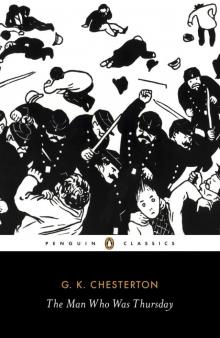 The Man Who Was Thursday: A Nightmare
The Man Who Was Thursday: A Nightmare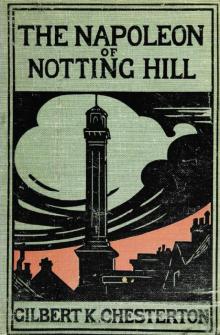 The Napoleon of Notting Hill
The Napoleon of Notting Hill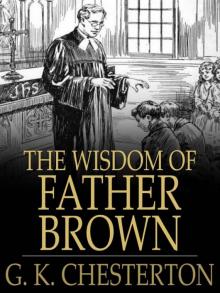 The Wisdom of Father Brown
The Wisdom of Father Brown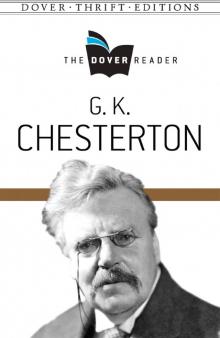 G K Chesterton- The Dover Reader
G K Chesterton- The Dover Reader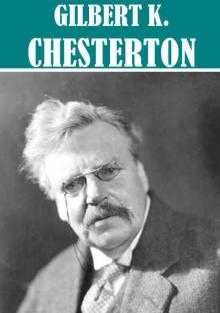 The Essential G. K. Chesterton
The Essential G. K. Chesterton The Trees of Pride
The Trees of Pride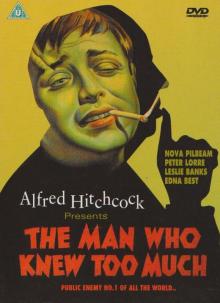 The Man Who Knew Too Much
The Man Who Knew Too Much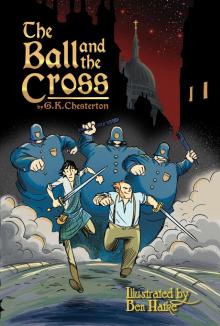 The Ball and the Cross
The Ball and the Cross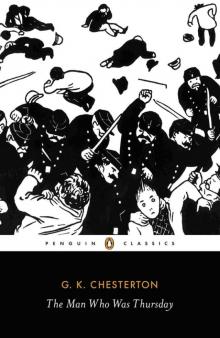 The Man Who Was Thursday (Penguin ed)
The Man Who Was Thursday (Penguin ed)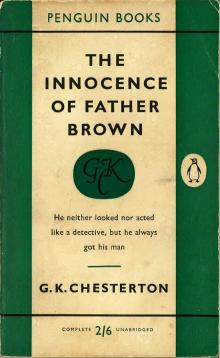 The Innocence of Father Brown
The Innocence of Father Brown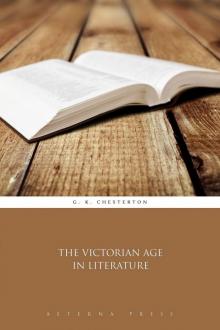 The Victorian Age in Literature
The Victorian Age in Literature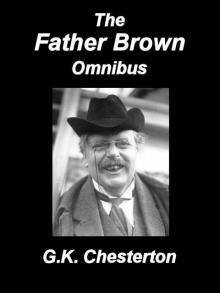 Father Brown Omnibus
Father Brown Omnibus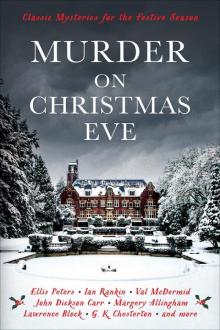 Murder On Christmas Eve
Murder On Christmas Eve The Blue Cross
The Blue Cross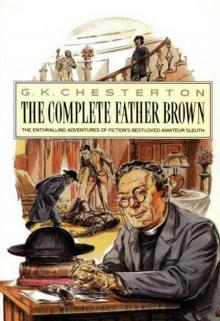 The Complete Father Brown Mysteries Collection
The Complete Father Brown Mysteries Collection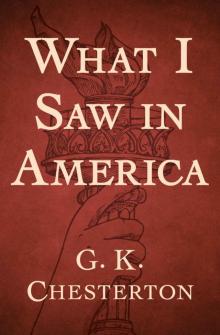 What I Saw in America
What I Saw in America